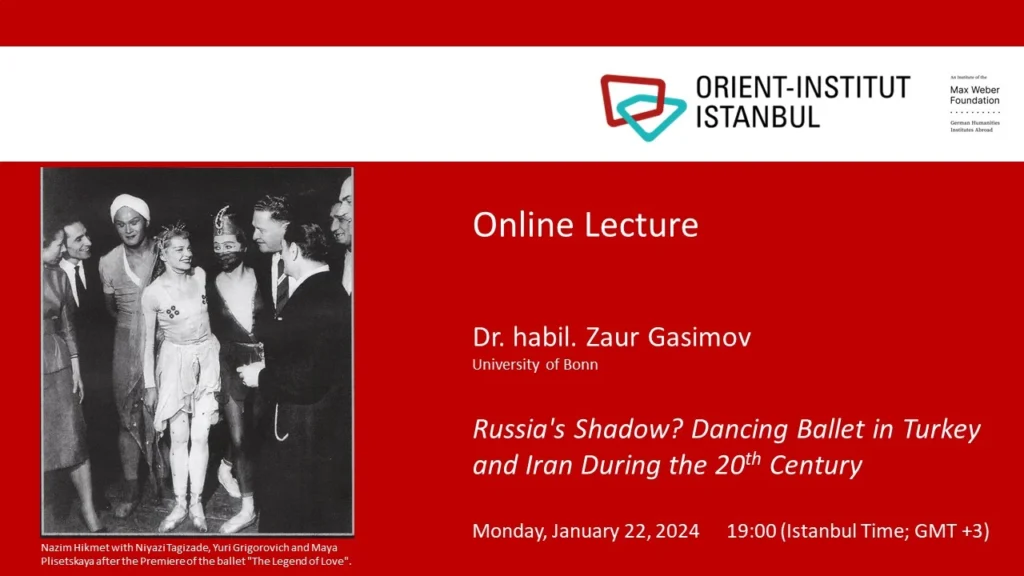
- Diese Veranstaltung hat bereits stattgefunden.
Russia’s Shadow? Dancing Ballet in Turkey and Iran During the 20th Century
Januar 22@7:00 pm–9:00 pm

Online Lecture
Monday, January 22, 2024 – 19:00 (Istanbul Time; GMT +3)
Dr. habil. Zaur Gasimov
University of Bonn
Russia’s Shadow? Dancing Ballet in Turkey and Iran During the 20th Century
The Russian Revolution of 1917 had an enormous impact on the Ottoman Empire and Persia. The two „White Russian“ emigrants Lidija Vassiljeva Krassa-Arzumanova, later Leyla Arzuman (1897-1988) and Madame Cornelli founded the first ballet studios in Istanbul (1931) and Tehran (1928) after they were forced to leave Russia in the wake of the Russian Revolution. Both came from the Caucasus, were trained in St. Petersburg and became pioneers of Turkish and Iranian ballet. In the 1930s, Sarkiz Džambazian and Elene Avedisyan founded further ballet schools in Iran: They had a decisive influence on the development of Iranian ballet in Tabriz (1933) and Qazvin (1938), while the couple trained by Madame Cornelli, Aida and Nejad Ahmadzade, became leading ballet dancers in Tehran and had a decisive influence on the further development of Iranian ballet until the Islamic Revolution. Aida (née Akhundzade) Ahmadzade came from a family of Tatar and Azerbaijani emigrants from Baku, while Nejad Ahmadzade had immigrated to Iran from Trabzon. After the Second World War, Turkey and Iran, both victims of Soviet imperialism, became pro-Western in terms of foreign policy: The choreographer Ninette de Valois, who had arrived from Great Britain, established the national ballet in both Ankara and Tehran by outsourcing the schools of Arzuman and Cornelli. It was only in the 1960s and even more intensively in the 1970s that Moscow succeeded in organizing a regular exchange in the field of ballet with Turkey and Iran.
Zaur Gasimov
Zaur Gasimov studied International Relations, International Law and History in Baku, Berlin and Eichstätt. From 2013 to 2019, he was a research fellow at the Orient-Institut Istanbul (Max Weber Foundation). In December 2020, he completed his habilitation in Modern History and Eastern European History at Johannes Gutenberg University Mainz. As a principal investigator of the DFG, Zaur Gasimov worked from 2020 to 2023 on the transfer of knowledge between Eastern (Central) Europe and the Republic of Turkey at the Department of Eastern European History at the University of Bonn. In February 2024,Gasimov will start with the joint manage of the Faculty of Economics and Administrative Sciences at TDU Istanbul. Zaur Gasimov has commented on current developments in Russian policy towards the Middle East and in the Caucasus for the BBC, Radio Free Europe, and ZDF.